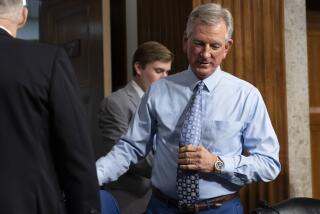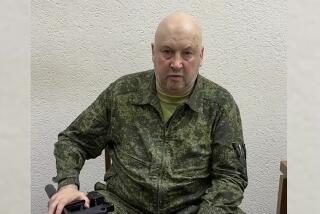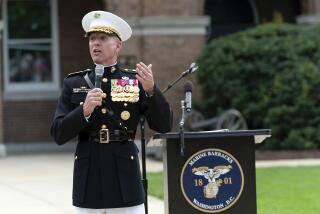Four-Star General Is Named to Take Over Iraq Command
- Share via
WASHINGTON — Two weeks before the United States is due to return sovereignty to Iraq, the Pentagon nominated a four-star general to command the 160,000 U.S.-led troops who will remain to provide security.
The Pentagon announced Tuesday that Gen. George W. Casey, the Army’s vice chief of staff, will replace Lt. Gen. Ricardo Sanchez as the top U.S. military commander in Iraq, as had been expected.
If confirmed by the Senate, Casey would be in charge of a revamped command structure that would have the delicate task of fighting a prolonged counterinsurgency inside a sovereign nation.
The new post will be as much a political job as a military one. Casey will work closely with Iraq’s newly formed interim government and the U.S. ambassador to Iraq, John D. Negroponte. Lt. Gen. Thomas Metz, the U.S. deputy commander, will remain in Iraq to assist Casey in running day-to-day military operations.
Casey has not commanded troops in combat, and his Middle East experience consists of service as a U.N. military observer in Egypt, according to his Army biography. Much of his career has been spent in Germany, where he was the Army’s V Corps chief of staff and operations officer, and in Washington, where he held several top positions on the Joint Staff, including director.
While Casey’s nomination is not expected to encounter trouble in the Senate, Pentagon officials said it was unclear whether he would be confirmed and in place by the time the United States hands over power to Iraqis on June 30.
Although Pentagon officials insist that the change has been planned for months and has no connection with the broadening investigation into prisoner abuse at the U.S.-run Abu Ghraib prison near Baghdad, Sanchez has come under increasing fire for the failure of military commanders in Iraq to halt violence toward Iraqi detainees.
Just last week, the Pentagon announced it was considering tapping a senior general to lead the investigation into the prison scandal, which probably would mean interviewing Sanchez about how orders from top commanders may have led to the abuses at Abu Ghraib. Sanchez placed military intelligence officers in charge of the prison in November, but has denied knowing anything about the detainee abuse until an Army specialist notified his chain of command in January.
Unlike many other senior Army generals, Casey, 55, who headed up the Pentagon’s Joint Staff before becoming the Army’s No. 2 officer, is said to enjoy a good relationship with Defense Secretary Donald H. Rumsfeld.
Casey is known to be a stickler for detail. With a mammoth task awaiting him in Iraq, Casey has spent the past several weeks seeking answers to the thorniest issues about his new job, Pentagon insiders say. These include how much freedom coalition forces will have in a sovereign Iraq and what the exact rules of engagement will be.
More to Read
Sign up for Essential California
The most important California stories and recommendations in your inbox every morning.
You may occasionally receive promotional content from the Los Angeles Times.










